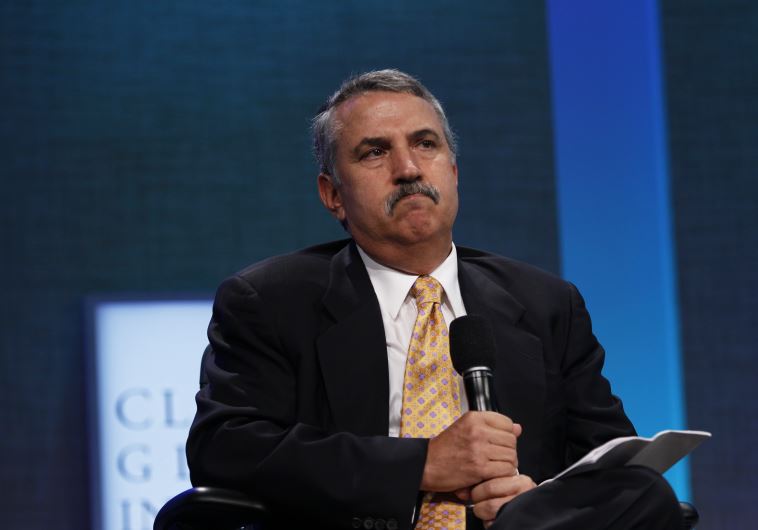Yair Lapid spoils Thomas Friedman’s Saudi deal – opinion
Just when Thomas Friedman thought he was on the verge of engineering a deal to give Saudi Arabia nuclear power, wouldn’t you know it, an Israeli politician comes along and spoils the soup. Only this time, the New York Times columnist’s nemesis is the leader of the Israeli left-wing opposition, Yair Lapid.
Friedman used to love Lapid. Last year, he wrote in the Times about how “sad” he was that Israel’s Bennett-Lapid government had collapsed. Lapid’s coalition had been “pragmatic” and “effective,” Friedman asserted. They “demonstrated that the seemingly impossible was possible.”
Friedman proclaimed that “the soul of Israeli democracy” would be “on the ballot” when Lapid faced off against Benjamin Netanyahu in the next Israeli elections. The Netanyahu camp was “merciless,” “divisive,” and – of course – “racist,” Friedman declared; electing Lapid was the only way to save Israel’s soul. And the Times columnist was optimistic – he was confident that Lapid “can make a comeback.”
I wonder if Friedman is still hoping for that “comeback,” now that Lapid is campaigning against Friedman’s Saudi plan.
The Wall Street Journal revealed on August 8 that Lapid told a visiting delegation of Democratic members of Congress: “I oppose any agreement that includes uranium enrichment in Saudi Arabia. The deal at the moment endangers Israel’s security and the region. It is forbidden to give Saudi Arabia any level of uranium enrichment. It will harm our struggle against Iran. It will lead to a regional [arms] race.”
 Thomas Friedman (credit: REUTERS)
Thomas Friedman (credit: REUTERS)Thomas Friedman must be heartbroken. Giving the Saudis a nuclear program is the centerpiece of the Middle East deal he is promoting. And now Lapid, of all people, opposes it – and is trying to convince prominent Democrats to oppose it, too.
For more than two decades, Friedman has been obsessively promoting one version or another of his Saudi plan. On February 6, 2002, he used his New York Times column to present a memo that he wanted President George W. Bush to send to Saudi Crown Prince Abdullah and other Arab leaders. The memo called for Israel to withdraw to the nine-miles-wide pre-1967 armistice lines, including re-division of Jerusalem, in exchange for Arab leaders recognizing Israel’s existence.
Friedman visited Saudia Arabia
Friedman then flew to Saudi Arabia, where he was granted a rare interview with Crown Prince Abdullah. Lo and behold, Abdullah unveiled a “Saudi peace plan” which just happened to be identical to what Friedman had been pushing. Friedman then used his February 17, 2002 column to announce the Saudi plan. Quite an unusual channel for an international diplomatic announcement!
The New York Times pumped up the Saudi proposal in its news columns. Writing on NBCnews.com, international affairs commentator Michael Moran noted: “What newspaper’s management can resist following up on a plan for Middle East peace that appeared to grow directly out of its own pages?”
The plan assumed that the Saudis had become moderate and were sincerely interested in living in peace with Israel. Friedman became, in effect, Riyadh’s most important Western spokesperson.
But his efforts were undermined when a Palestinian terrorist attack took place just as Friedman’s PR campaign was kicking into high gear. A suicide bomber struck at a Passover seder in a Netanya hotel. Twenty-seven people were murdered and 140 were wounded. It was the most notorious attack of the Palestinian Arabs’ Second Intifada, which lasted from 2000 to 2003.
It took a long time, but finally, in 2017, a Palestinian leader revealed that the Second Intifada terrorism was financed by the “moderate” government of Saudi Arabia. Nabil Sha’ath, the former foreign minister and chief negotiator for the Palestinian Authority, made that stunning revelation in an interview with ON TV on February 7, 2017. Sha’ath described how, in the autumn of 2000, Crown Prince Abdullah summoned him to Riyadh, even sending a private jet to Jordan to pick him up.
“So I went to his palace,” Sha’ath recalled. Abdullah said: “You are in the midst of an Intifada. It may last two or three years. They will freeze all your assets. How will you continue this Intifada? It takes money.”
Sha’ath continued: “So I named the largest figure I could think of – one billion dollars. I said that one billion dollars could keep us going for two or three years. ‘It’s on me,’ he said… ‘I will pay half and will collect the other half [from other Arab leaders]… That’s what he did. That was the money that enabled us to survive in the three years of the Intifada.” (Thanks to MEMRI, the Middle East Media Research Institute, for the translation.)
Apparently, counting on the likelihood that most people have forgotten about the Sha’ath revelation, Friedman is now promoting a new version of his old Saudi plan. In his column, and through a recent interview with President Biden, Friedman is pushing for a deal in which Israel would make irreversible concessions on the Palestinian Arab issue, and the Saudis would be given a nuclear program by the US – all in exchange for a piece of paper in which the Saudis would recognize that Israel exists.
Friedman probably assumed that the Israeli Right would resist the plan. Instead, he now finds the leader of the Israeli Left denouncing it. I don’t suppose Friedman will be calling Lapid “pragmatic” and “effective” again any time soon. That kind of praise is reserved for those who are politically useful.
The writer is the president-elect of the Religious Zionists of America. He is the father of Alisa Flatow, who was murdered in an Iranian-sponsored Palestinian terrorist attack in 1995, and the author of A Father’s Story: My Fight for Justice Against Iranian Terror.





Comments are closed.